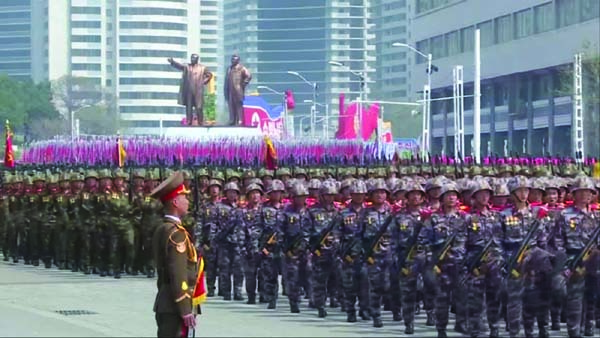
Reuters, Tokyo :
The United States is not ruling out the eventual possibility of direct talks with North Korea, Deputy Secretary of State John J. Sullivan said on Tuesday, hours after Pyongyang warned nuclear war might break out at any moment.
Talks between the adversaries have long been urged by China in particular, but Washington and its ally Japan have been reluctant to sit down at the table while Pyongyang continues to pursue a goal of developing a nuclear-tipped missile capable of hitting the United States.
“Eventually, we don’t rule out the possibility of course of direct talks,” Sullivan said in Tokyo after talks with his Japanese counterpart.
“Our focus is on diplomacy to solve this problem that is presented by the DPRK. We must, however, with our allies, Japan and South Korea and elsewhere, be prepared for the worst, should diplomacy fail,” he said.
Tension has soared following a series of weapons tests by North Korea and a string of increasingly bellicose exchanges between U.S. President Donald Trump and North Korean leader Kim Jong Un.
Leaflets apparently from North Korea calling Trump a “mad dog” and depicting gruesome images of him have turned up across central Seoul, adding an unusually personal element to North Korean propaganda.
“The situation on the Korean peninsula where the attention of the whole world is focused has reached the touch-and-go point and a nuclear war may break out any moment,” North Korea’s Deputy U.N. Ambassador Kim In Ryong told a U.N. General Assembly committee on Monday.
“As long as one does not take part in the U.S. military actions against the DPRK (North Korea), we have no intention to use or threaten to use nuclear weapons against any other country,” according to Kim’s prepared remarks for the discussion on nuclear weapons. Kim did not read that section out loud.
South Korea and the United States began week-long joint Navy drills in the waters around the Korean peninsula on Monday, involving about 40 ships from both militaries, including the nuclear-powered USS Ronald Reagan aircraft carrier, the South’s defense ministry said.
The North’s state media said on Tuesday the allies’ “desperate efforts” to block the advance of the country would only vindicate that it should continue its nuclear program “to the last.”
“The DPRK has been fully ready for all the U.S. is resorting to, including sanctions, pressure and military option, as it has the tremendous nuclear force for self-defense and irresistible strength of self-reliance and self-development,” the official KCNA news agency said in a commentary.
The DPRK stands for North Korea’s official name, the Democratic People’s Republic of Korea.
Asked about the North Korean envoy’s warning of nuclear war, Chinese Foreign Ministry spokesman Lu Kang said it would not be in anyone’s interest.
“China still hopes that all parties, in this situation where things on the Korean peninsula are highly complex and sensitive, can exercise restraint and do more to benefit the lowering of tensions in the region,” Lu told a daily news briefing.
The U.N. Security Council has unanimously ratcheted up sanctions on North Korea over its nuclear and ballistic missile programs since 2006.
The most recent U.N. sanctions banned exports of coal, iron ore and seafood, aimed at cutting off a third of the North’s total annual exports of $3 billion.
Experts say North Korea has been scrambling to find alternative sources of hard currency to keep its economy afloat and advance its weapons program.
North Korea’s Lazarus hacking group was probably responsible for a recent cyber heist in Taiwan, cyber-security firm BAE Systems Plc said on Monday.
Taiwan’s Central News Agency said last week that hackers had sought to steal some $60 million from the Far Eastern Bank, but it had recovered all but $500,000.
BAE Systems and other cyber firms have previously linked Lazarus to last year’s $81-million cyber heist at Bangladesh’s central bank.

